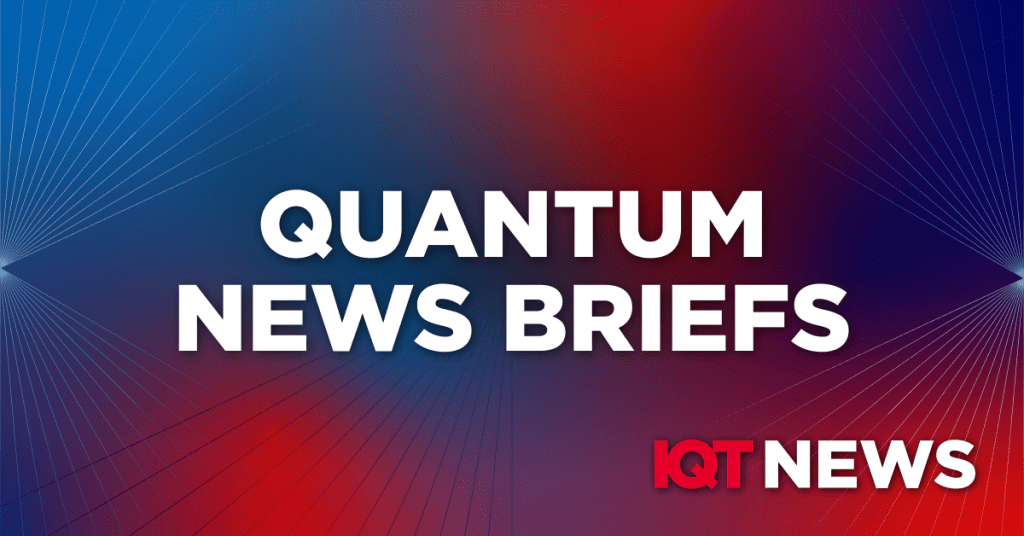News Briefs:
Duality Quantum Accelerator welcomes 5 startups into fourth cohort
The Chicago-based Duality quantum accelerator has accepted its fourth cohort of startups into its program as the quantum revolution arrives in Illinois as per the August 1 news release.
The five startups in this cohort are developing products and solutions across the quantum technology landscape that includes quantum computing, sensing, and communication, and will look to evolve their technologies and business practices to succeed in various industries like biomedicine and aerospace.
Duality Cohort 4 Startups:
- SynthBits (Chicago, Illinois) is a quantum sensing company building quantum microscopes that will accelerate advancements in medicine, diagnostics, and research.
- Photon Queue (Urbana, Illinois) is introducing efficient quantum memories to expedite the adoption of quantum communication, computing, and metrology technologies.
- Artificial Brain (Wilmington, Delaware) is a quantum computing company specializing in real-time software for extremely complex optimization problems in aerospace, defense, and energy, which are beyond the reach of current classical computing alone.
- QuantumAstra (Frisco, Texas) is developing a portable high-sensitivity quantum sensor and a platform for quantum AR/VR simulations.
- Quantum Rings (Broomfield, Colorado) is making quantum computing more accessible by offering tools for developers, including an advanced quantum simulator for quantum circuits.
QuEra launches the QuEra Quantum Alliance with leading tech companies
Through the QuEra Quantum Alliance, QuEra’s goal is to identify and collaborate with leading technology and solutions companies to deliver unparalleled quantum computing experiences to organizations worldwide.
Benefits of the QuEra Quantum Alliance include:
–Exclusive Events and Joint Go-To-Market Activities: Throughout the year, QuEra and its partners will conduct joint go-to-market activities, including webinars and exclusive events at industry conferences to promote joint innovations and offerings.
–First Access to QuEra Technology: Partners and select customers will receive sneak previews and early access to QuEra’s breakthrough innovations, allowing them to customize their offerings as necessary.
–Direct Support from the QuEra Scientific Team: QuEra’s world-class team of engineers, software, and application experts will collaborate with partners to help realize the potential of quantum computing.
Quantum Computing, Inc. releases mid-year business update
The update provides an in-depth look at QCi’s strategic progress and positive changes implemented over the past six months.
Go-To Market Strategy: QCi is continuously evolving its business while maintaining a singular focus on photonics solutions for real-world applications.
Thin Film Lithium Niobate (TFLN) Foundry: QCi is on schedule to establish in 4Q24 the first U.S.-based fabrication facility devoted to TFLN processing in Tempe, Arizona.
Launch of New Products: QCi has finalized the development of two new platforms in high-performance computing and one broad remote sensing platform focusing on the use of LiDAR-based applications.
Accessible and Affordable Campaign: To introduce potential customers to our new products, QCi has launched a new marketing campaign focusing on the practical advantages of its optical technology. With its affordable price, small, stackable size, and low energy consumption, QCi believes that the Dirac-3 computer offers unsurpassed price and performance.
Two New Leaders Join QCi Team: To lead the company’s new sales strategy, QCi has appointed Richard Nelson to serve as Senior Vice President of Business Development and Pouya Dianet to serve as Director for its TFLN Optical Chip Sales.
Selection of New Independent Auditor and Investor Relations Advisor: QCi is committed to maintaining transparency and ensuring the highest standards of financial reporting. Recently, the company announced a new auditor, BPM LLP as well as engaged IMS Investor Relations as its new investor relations firm.
In Other News:
Scientists & lawmakers in USA, UK & EU ramp up efforts to advance quantum computing after China’s apparent breakthrough in room-temperature time crystals
A team of physicists hailing primarily from Tsinghua University in China, with contributions from scientists in Denmark and Austria, published peer-reviewed research on July 2 detailing the creation and observation of room-temperature time crystals. The realization of room temperature time crystals could solve one of the biggest problems in the field: figuring out how to create stable qubits (sort of the quantum version of classical computer bits) that don’t require massive amounts of power and infrastructure to form and maintain.
Since the paper was published, quantum research labs in the West have announced numerous initiatives to extend existing efforts in the field of quantum computing and to create new research partnerships
In 2021, an international team of scientists working with Google’s quantum computing lab simulated time crystals using a quantum computer.
Now, the Tsinghua team appears to have created time crystals at room temperature. This, theoretically, allows time crystal technology to be employed in non-laboratory equipment and could serve as a massive accelerator for the development of useful quantum computers.
